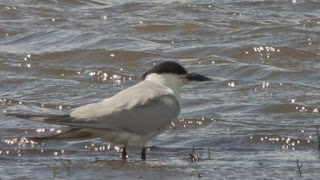As regular CFZ-watchers will know, for some time
Corinna has been doing a column for Animals & Men and a
regular segment on On The Track... about out-of-place birds,
rare vagrants, and basically all things feathery and Fortean.
Because we live in strange times, there are more and more bird stories that come her way, so she has now moved onto the main CFZ bloggo with a new column with the same name as her aforementioned ones...
Extremely rare
squacco heron spotted at Welney reserve
A squacco heron (Ardeola ralloides) arrived at Welney
reserve last weekend. This is an extremely rare bird which
usually spends the summer in southern Europe. It is not known why the bird has appeared in
the UK, with squacco herons usually breeding in eastern Europe.
Warden Steve Wiltshire said: “It is always exciting
to see a rarity on site but this particular individual is a very striking bird
in its full breeding plumage.
“The breezy weather over the weekend meant that the
plume of feathers on the back of the neck has been in full flow.
“The bird has been making itself at home in the
shallow flooded washes in full view of our reedbed hide and seems quite content
fishing in the ditches among all the other birds”.
To check on the latest status of the heron and all
the other sightings, click on www.wwt.org.uk/welney
Gamekeeper fined for
trapping and starving Buzzard
RSPB
Scotland has welcomed the conviction of a Perthshire gamekeeper who allowed a buzzard to starve to death in a trap. The case began when Tayside Police
responded to a report from a hill-walker that three crow traps had been found
on the Glen Lyon Estate in Perthshire containing, respectively, a dead buzzard,
a dead sparrowhawk and two chaffinches. At Perth Sheriff Court, Jonathan Smith
Graham, a gamekeeper on the estate, pleaded guilty to using a crow trap in
which a buzzard was trapped and starved to death. His not guilty plea was accepted
for two other charges.
Sheriff
McCreadie said: "I am satisfied that this is a case where a fine is
appropriate, not only for you, but to discourage others." Graham was fined
£450. Speaking following the court case, Ian Thomson, RSPB Scotland's Head of
Investigations, said: "We welcome the conviction of Mr Graham and the
strong comments made by the Sheriff. This latest case illustrates, yet again,
the lax approach taken by some gamekeepers to following the licence conditions
laid out by the Scottish Government. The use of these licences is a privilege,
and with this comes responsibility. Mr Smith clearly did not take his
responsibilities seriously and has now lost that right."
Rare bird
delights Llanelli wildlife centre visitors
An extremely
rare gull-billed tern (Gelochelidon nilotica), arrived at Llanelli wildlife centre this week
and seems to have taken up residence.
The species prefers warmer climes and has not been seen in
Carmarthenshire in 16 years.
Photo: Mark Hipkin
It’s
thought the recent spate of bad weather has blown the bird off-course from its
usual summer haunts.
This is
only the second record of a gull-billed tern in Carmarthenshire - the first was
recorded back in 1996, also at the Wildfowl & Wetlands Trust in Llanelli.
Two pairs of a rare bird species have chosen to make
Teesdale their breeding ground – the furthest recorded Northern inland location
in the UK.
Photo: Wikipedia
Avocets (Recurvirostra avosetta) have been visiting marshland in the south of the dale for
the past five years but this year, the elegant black and white waders have
decided it is an ideal place to bring up their young. The two pairs have
successfully hatched five young between them.
The site is being kept secret for now. But local countryside lover
Dave Moore, who has been recording wildlife in Teesdale for the past 40 years,
is thrilled that the avocets have chosen to breed here.
He said: “I never thought I’d see this in Teesdale. There are only
about 800 breeding pairs in the whole of the UK and as far as I know, these are
the furthest north. It’s just magical.”
Avocets were once extinct in Britain because of habitat
destruction and persecution of their eggs.
However, they started making a slow return during the Second World
War when they tentatively made homes in an area in the south that was
turned into marshland to cause difficulty for German invaders.
Mr Moore said: “When you get a pair that nest, either they come
back the next year or their young will.”
Rare birds stolen from shed
THIRTY-three rare breed Japanese chicks
have been taken from a shed in Lakenheath.
The birds, which are believed to be worth
around £500, were stolen from the shed in Wingfield Road between 10pm Monday,
June 4, and 7.30am the following morning.
It is thought that the chicks were
removed in sacks also stolen from the same shed.
Suffolk Police said there had been no
attempt by the thieves to steal adult birds in adjoining pens at the property.
Anyone with information should contact
Suffolk Police on 101 quoting reference mh/12/1102.
Stunning White-winged Black Tern graces Cleveland
Lakes Reserve, Cotswold Water Park
Picture: BTO
White-winged Black Terns have been sighted in CWP on a number of occasions in the past, but sightings are usually of juveniles in the autumn. A stunningly plumaged adult is a rare, but very welcome, surprise for local birders!
Further
information about birding in the Cotswold Water Park, or for
further information about the Cotswold Water Park Trust click here.
























